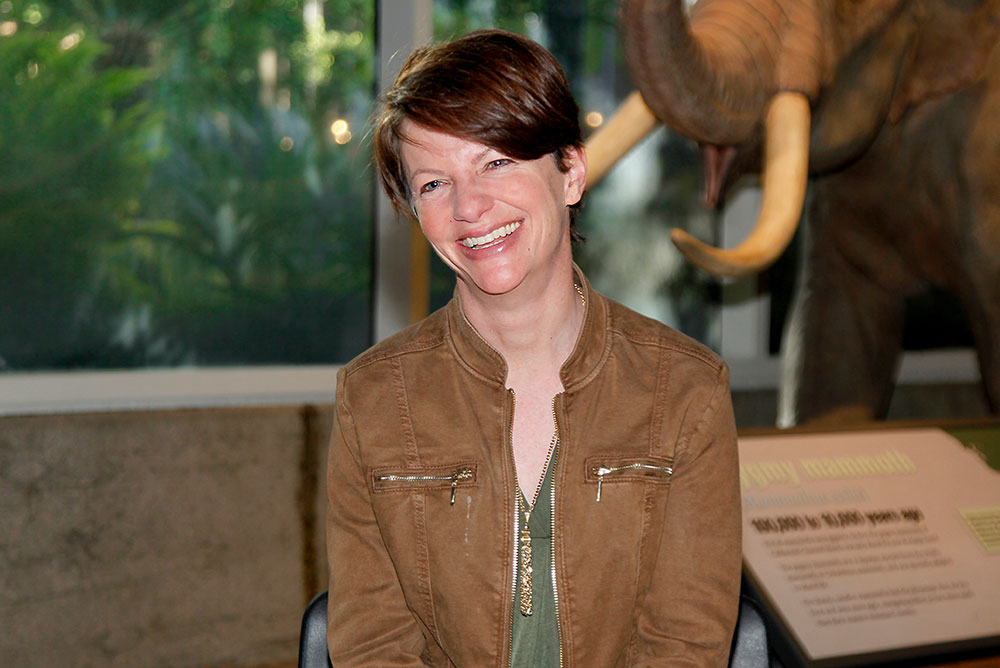
Photo by Aaron Salcido.
Amanda Ripley is an author, an investigative journalist, and the host of the Slate podcast “How To!” She’s also the co-founder of Good Conflict, a company that creates workshops and original content to help people get smarter about how they fight. Before taking part in “How Can Our Communities Escape Polarizing Conflict,” a Zócalo/California Wellness Foundation event, co-presented with the Natural History Museum of LA County, Ripley joined us in our green room at the La Brea Tar Pits and Museum to chat about her favorite place to write, her most unpopular opinion, and the first conflict she ever mediated.
As someone who has ties to both coasts: Are you more of a West Coast person or East Coast person?
I’m definitely an East Coast girl. But I love the mountains—the weather, obviously, and the excitement of California.
You’re based in D.C. What’s your favorite memorial or monument there?
Probably the D.C. War Memorial. There’s something mournful about it. It’s very austere and small, but it feels dignified, and it’s off kind of on its own. It’s on the Mall, but you don’t really see it coming.
What’s the first conflict you ever remember mediating?
My parents. For everybody, I think, the first conflict they’re exposed to is their families’. I handled it the totally wrong way. I would always try to intervene in ways nobody was asking me to do. So I guess you could say that’s my first failed mediation. As a journalist, I was always in conflict or near conflict or writing about conflict, and it was only in the last five years that I really started to see how much we leave uninvestigated—there’s so much underneath the conflict that we tend to not explore. We’re kind of like a moth hovering around the flame of a conflict; there’s a lot of really interesting stuff that mediators do to try to get underneath it. That’s been really transformative to realize that.
What’s your hidden talent?
The weird thing that I do now is I really like to write and work outside. So you’ll often find me in various locations. It was difficult in the pandemic, right? Because so many coffee shops were closed. So, I’d go on my bike and find a table in Rock Creek Park and just work there for like three hours. I think it’s just getting away from the clutter of your desk and regular life that I find really energizing.
You’ve played soccer since you were 7, and we hear you’ve also coached. What’s your best coaching advice?
Don’t yell at the kids when they’re playing the game. I’m astounded to this day how rarely that is observed. Even though U.S. Soccer now trains everyone not to do this. There’s cognitive reasons for it: The brain cannot function well, with agility, with that much stress on it. And soccer, in particular, is a decision-making game. If you’re yelling at a kid, they’re going to make bad decision. So that’s a pet peeve of mine.
What is your most unpopular opinion?
I have so many! It depends on the crowd, but one would be not to write people off, ever. Someone may be insufferable with their opinions and style of arguing right now, but I’ve seen people change dramatically. If you don’t maintain any tie, they have nowhere to go when they want to change. So, whether they’re leaving a cult or trying to be less of a conflict entrepreneur or trying to atone for their sins, they have to have somewhere to go.
What’s your guilty pleasure of the moment?
I read not very good mysteries to go to sleep. It’s ideal if they happened about 50 to 100 years ago and they’re not very literary. I wouldn’t say they’re terrible, but they’re not literary. I love it. I spend all day reading about horrible true things that happen, and I just can’t do it after 9 PM. So these World War II mystery novels about women detectives in London or something, for me, it’s a sleeping pill. I cannot go to sleep unless I do this for ten minutes.



